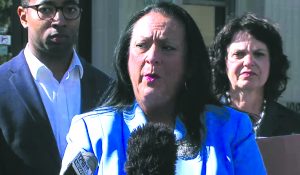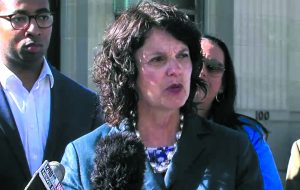Advocates, legislators make case to hike teacher’s salaries
By Kevin Beese Staff Reporter — October 7, 2018
Connie Charlesworth, a supervising professor of student-teachers at Illinois College in Jacksonville, said Illinois college students are not going into teaching because of the low pay in many districts in the state. Charlesworth is a former teacher herself, who after 30 years of experience and having a master’s degree made $45,000. (BlueRoomStream.com)
State Rep. Sue Scherer (D-Decatur) remembers her time as a public school teacher and the continual issue she had with classroom supplies.
Early one school year, she broke the stapler that was in her classroom. She went to the main office to get a new one, but was turned away empty-handed.
“‘You should have anticipated that when you did your budget last May, There’s not enough money to buy you a new stapler,’” Scherer remembers being told. “I said, ‘I only got $110 and that doesn’t go very far to run an entire classroom for an entire year and my stapler wasn’t broke so I didn’t buy a new stapler.’”
The response was “‘Well, you’ll just have to wait till next year,’” Scherer recalled.
She said she wound up with a box of “everybody’s half-way-don’t-work staplers” as a way to get by.
When teachers dig into their own pocket to buy classroom supplies, clothe children and even get them eyeglasses, Scherer said at a Sept. 26 press conference in Springfield, it is unconscionable that Gov. Bruce Rauner vetoed a proposal that would have raised the minimum salary for teachers in Illinois to $40,000.
“This is about the last straw,” Scherer said. “… His veto was a slap in the face to educators.”
State Rep. Christian Mitchell (D-Chicago) and state Sen. Andy Manar (D-Bunker Hill) said they will lead the effort to override the governor’s veto.
Scherer said she remembers being told by one teaching colleague, “I spend more on my garden than we are allowed in teacher supplies.”
Scherer said that state will not attract young people, leaving college with mountains of student debt, to the teaching profession without competitive salaries. She noted that she knows of one school district that is short 34 teachers and the school year has already started.
“We have a severe teaching shortage in every area from Pre-K to eighth grade in every single subject,” Scherer said.
Connie Charlesworth, a longtime teacher at Triopia Junior/Senior High School in Morgan County, agreed.
Charlesworth, who now works as a supervising professor of student-teachers at Illinois College in Jacksonville, said that in some subject areas the number of licensed teachers is down one-third to one-half from what it was five years ago.

State Rep. Sue Scherer (D-Decatur) tells of her struggles with having adequate classroom supplies as a teacher. She said the lack of support and good pay for all teachers is gripping the state. “We have a severe teaching shortage in every area from Pre-K to eighth grade in every single subject,” Scherer said. (BlueRoomStream.com)
Having 30 years of classroom experience and a master’s degree, Charlesworth said she topped out at $45,000 before retiring from Triopia. At 43 years of age, Charlesworth became the sole bread winner for her family when her husband was killed in a farming accident.
She said the lack of livable wages is keeping many young people from entering the teaching profession.
“Our college students are not stupid. They know how to do the math,” Charlesworth said. “They’re taking a look at how much their education is costing them. They’re also taking a look at their starting salary as teachers and they have decided in great numbers not to go into the profession.
“Young people are voting with their feet,” she added. “I don’t think any of us want our children and grandchildren going to schools without highly qualified teachers … If we are going to doom them to gentile poverty, then kiss goodbye quality education in the state of Illinois.”
Manar said the teacher shortage is most greatly affecting underfunded school districts as determined by the State Board of Education’s new Evidence-Based Funding formula. The formula measures what an adequate funding target is for each school district in the state based on enrollment numbers, region of the state it is in and nearly three dozen other factors. Districts listed at 100 percent have enough money through state dollars and local taxes to adequately cover educational needs for all their students, according to the State Board of Education.
Manar said that in Metro East communities near St. Louis, teachers “can drive 15 miles and make five figures more,” noting that that has caused some “poaching” of top teachers.
Mitchell said the funding disparity between Illinois school districts needs to still be addressed. He noted a school library in his district had no books until donations came in while in Winnetka students are given free Chromebook computers.
In his veto of the legislation that would have ensured all teachers in Illinois made at least $40,000 per year by 2022-23, Governor Rauner said minimum pay legislation is neither the most efficient nor the most effective way to compensate teachers.
“This approach to teacher compensation both limits a school district’s local control and imposes a significant unfunded mandate on school districts,” Rauner said. “… Legislative action is not the most efficient way to maintain relevance.”
Rauner said there are innovative teacher compensation strategies that, if adopted and implemented, would preserve local control and protect districts from the burden of even more unfunded mandates.
“Things like pay-for-performance, diversified pay for teachers in hard-to-staff schools or subjects, or pay incentives for teachers with prior work experience are all viable options to provide greater compensation for teachers,” the governor said. “I highly encourage local school districts to adopt and implement the compensation structures that best suit their local needs.”
kbeese@chronicleillinois.com







